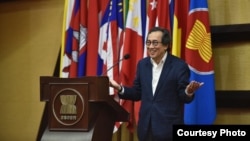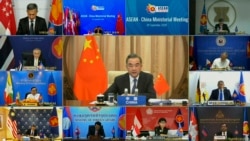Former Singaporean diplomat Bilahari Kausikan said on Friday that Southeast Asian countries needed to consider revoking ASEAN membership for Cambodia and Laos for allowing an external power to exert influence on them, a thinly-veiled reference to their proximity to China.
Bilahari Kausikan was speaking at a webinar organized by Singapore-based ISEAS Yusof Ishak Institute on Friday, where he questioned the neutrality of Cambodia and Laos and their commitment to ASEAN; suggesting that their inclination to act as proxies for China was contrary to regional interests.
“True neutrality means knowing your own interests, taking positions based on your own interests and not allowing others to define your interests for you by default,” he said.
“To state things bluntly, I see Cambodia and Laos teetering precariously on the edge of making a parallel mistake as that which led to very tragic results for their countries in the late 1960s and 1970s,” he added.
He also pointed to the nations’ lack of engagement in the South China Sea controversy – both linked to China’s involvement in the region.
“They have some difficult choices to make,” Bilahari Kausikan said. “And if they should make wrong choices, they will confront ASEAN as a whole with difficult choices. We may have to cut loose the two to save the eight.”
Cambodia had famously refused to publish a joint ASEAN communique in 2012 when it chaired the regional bloc because it contained language on the maritime dispute.
On Tuesday, Cambodian government mouthpiece Fresh News published an open letter, allegedly penned by a group of current and former Cambodian diplomats, called the former Permanent Secretary of Singaporean Foreign Ministry a “wolf warrior” and someone who was “attention seeking, inconsistent, and incoherent.”
The letter attacked Bilahari Kausikan and ISEAS Yusof Ishak Institute for promoting the idea that Cambodia was China’s “puppet,” and questioned whether this was the official position of the Singaporean government.
“Bilahari and ISEAS-Yusof Ishak Institute should stop pretending as if they have the monopoly on knowledge and wisdom,” the letter reads. “[S]peaking of agency, which was the whole gist of Bilahari’s paper, one wonders for which power is he and ISEAS-Yusof Ishak Institute acting as ‘agents’ for?”
The ISEAS Yusof Ishak Institute is a research center established by an act of the Singaporean parliament in the 1960s and its autonomy and operational conduct are codified by the legislature.
VOA Khmer could not reach Bilahari Kausikan for comment on Tuesday. Foreign Ministries in Laos, Cambodia, and Singapore could not be reached for comment.
Cambodian People’s Party spokesperson Sok Eysan said Bilahari Kausikan’s views will not influence other ASEAN members into considering such options.
“He as a foreigner does not have a full knowledge to comprehensively understand the situations in Cambodia and Laos,” Sok Eysan said. “This is just a lone view reflecting his own political and ideological mindsets.”
Observers have raised concerns over Cambodia’s continued sway towards China, which is now a major export destination and the number one source for foreign direct investment. These concerns have been exasperated by speculation that the two countries have signed a secret agreement to allow for Chinese military presence on Cambodian soil.
Similarly, Laos’ indebtedness to China was reported at about 45 percent of the former’s GDP in 2019, according to the Sydney-based Lowy Institute. Credit-rating agencies like Fitch and Moody’s have downgraded Laos credit scores on account of this increasing indebtedness.
In September, this indebtedness was a factor when Laos signed a deal with a Chinese state-owned firm to give it complete control over the mountainous country’s electrical grid.
Political analyst Lao Monghay said both countries are viewed as “swords” that are helping China cut ASEAN into pieces.
“Both countries are seen by some as being used as a tool by China or they are being viewed as an obstacle for ASEAN to reach any decisions [against China],” Lao Monghay said.
ASEAN admitted Cambodia as its last member state in 1999. The Kingdom is scheduled to chair the regional bloc again in 2022, the first time since it was accused of blocking the 2012 joint communique.
Singapore’s first Prime Minister Lee Kuan Yew reportedly told American diplomats in 2007 that ASEAN was wrong for rushing to admit Cambodia, Laos, Myanmar, and Vietnam, adding that Cambodia’s political system and history were “difficult” and “too personalized around Prime Minister Hun Sen”, according to U.S. cables made public in 2010 by the Wikileaks.
Last year, current Singaporean Prime Minister Lee Hsien Loong irked Hanoi and Phnom Penh for characterizing Vietnam’s toppling of the Khmer Rouge regime in the late 1970s as an “invasion.”





